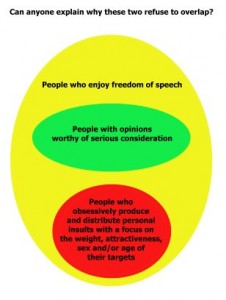What happened to and about Chagnon is a fascinating (and appalling) example of ideological policing in anthropology. He tells a little about it in the interview.
SK: Most importantly, let’s turn to the science. What were the two heresies you proclaimed in your publications on the Yanomamö that went against the prevailing orthodoxy in anthropological community?
NC: Well, I didn’t realize until I began committing these heresies, how entrenched that orthodoxy was. The first reaction was to my having described the Yanomamö as having wars and being quite violent in the absence of provocations from outside societies or the presence of military units from organized political societies, like a nation-state, first punishing them. At that time, they didn’t have any states surrounding them that had any influence on their behavior.
So, without realizing it, I was threatening the general attitude within anthropology that all native peoples are pacific and live an angelic kind of life, gliding through the jungle with lithe, scented bodies, being altruistic, sharing their food, and willing to cooperate with the stranger that comes in and wants to learn about them and their culture, and anxious to share their knowledge and life histories with that stranger.
Well, they aren’t that way. And my descriptions apparently [so] annoyed my colleagues that some of them began to publish statements “correcting” me.
Huh. No peoples are pacific and angelic. Peoples aren’t like that, not even native ones.
NC: Now if a scientist studying yaks, bullfrogs, bats, deer, salamanders, or any non-human animal stated that they competed for opportunities to mate, no one in biology would have taken that to be anything other than an accurate observation. But if you say that about human beings, it becomes “lurid speculation.”
SK: It’s hardly “lurid speculation” to someone like me who grew up in a mob town in Jersey and spent (or misspent) a lot of time back in my military service days shooting pool in bars. I didn’t make careful anthropological observations, but I saw that behavior regularly.
And while I was in college at the same time I was learning the prevailing orthodoxy in my introductory anthropology course, I was also taking a course on the classical culture of Ancient Greece in the very next building, where we read in The Iliad about Helen, Paris, Menelaus and the Trojan War. So why was “males fighting over females” considered so heretical?
NC: It may be that a number of cultural anthropologists come from a general class of the American public that goes to private high schools and elite colleges and universities and ends up teaching in major universities. Not enough of them have spent time in pool halls and bars, as maybe you and I have, so they haven’t anything called common sense.
Don’t they even go to movies? There are pool halls and bars in movies. Or what about summer jobs? Or, as Frank Miele says, the goddam Iliad.
SK: When the final words are written on Napoleon Chagnon and his critics in academia and in the media, what do you think they will be?
NC: I have no idea! Who’s going to write them? If they’re post-modernists they’re going to say something very different from what a scientist would say.
Are you assuming that whoever writes these words about Chagnon will be a rational human being with common sense who believes in the existence of the real world independent of its observer?
Heh. Good one.
Then Miele says something I think is quite telling.
SK: As Skeptics we have a faith which, much like a religious faith, is not itself provable. It’s a faith that in the end demonstrable truth will win out, however unpleasant or unpopular. And while there will be swings to the irrational or the incorrect here and there, in the long run reason and experiment will triumph, just as they have in medicine and so many other fields.
Yes! I’m glad he puts it that way – because it’s a faith I’ve often noticed, and one that I think is often absurd. It does get invoked as if there were some kind of magic at work that guarantees that – as Miele puts it without apparently noticing – “in the end” truth will win out. What end? What is “the end”? There is no “end.” Later he says “in the long run” and that’s a figment too. Those two phrases and the idea they carry make this figment possible – the idea that now is not “in the end” nor yet “the long run” but some other moment is, so even if truth is being buried right now, somehow in that mystical far off end/long run, it will claw its way to the surface and burst out triumphantly.
That’s just magical thinking. Truth loses all the time, and there is no end and no long run, there is only a series of nows.
So if that really is a faith that skeptics (or Skeptics – do they really refer to themselves with a capital letter?) share, then that’s just more reason for me to say I’m not one. Only it’s odd. It seems to me it’s more skeptical to be skeptical of magical ideas that truth will win “in the end” than it is to take it as faith.


(This is a syndicated post. Read the original at FreeThoughtBlogs.)



